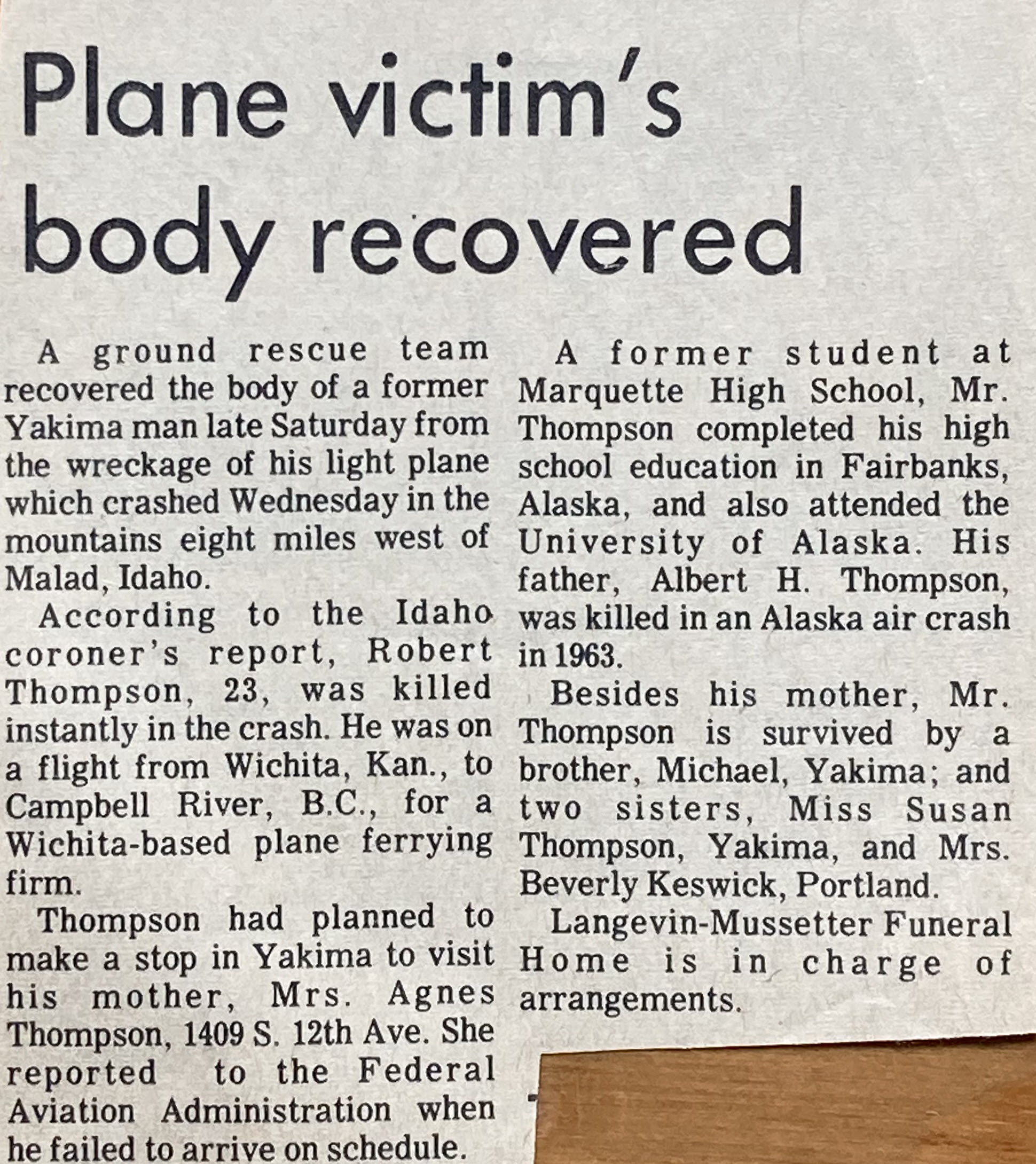Bobby
by Mike Thompson, 6/19/2022
Bobby was born in December of 1944 while Dad was away flying in India and China during the Second World War. Mom was living in Long Beach at the time while waiting for Dad to return (and I'm sure praying every day that he would make it back).
Shortly after the war, Dad took a job with Standard Oil in Peru, flying a Grumman Goose to carry geologists into the upper Amazon to prospect for oil. Dad, Mom, Bobby, who was two or three years old, and Susan, who was a newborn, lived in Lima. One day Bobby asked for something and was told that he couldn't have it because it cost too much money. Later that day Mom went looking for him but couldn't find him, and when a thorough search didn't turn him up she became alarmed that he had been kidnapped. But Bobby showed up on his own that evening, riding back on his tricycle. He said that he had gone looking for work, so that he could make the money needed to buy the thing that he wanted. It was an early indication of Bobby's energy, determination, and daring.
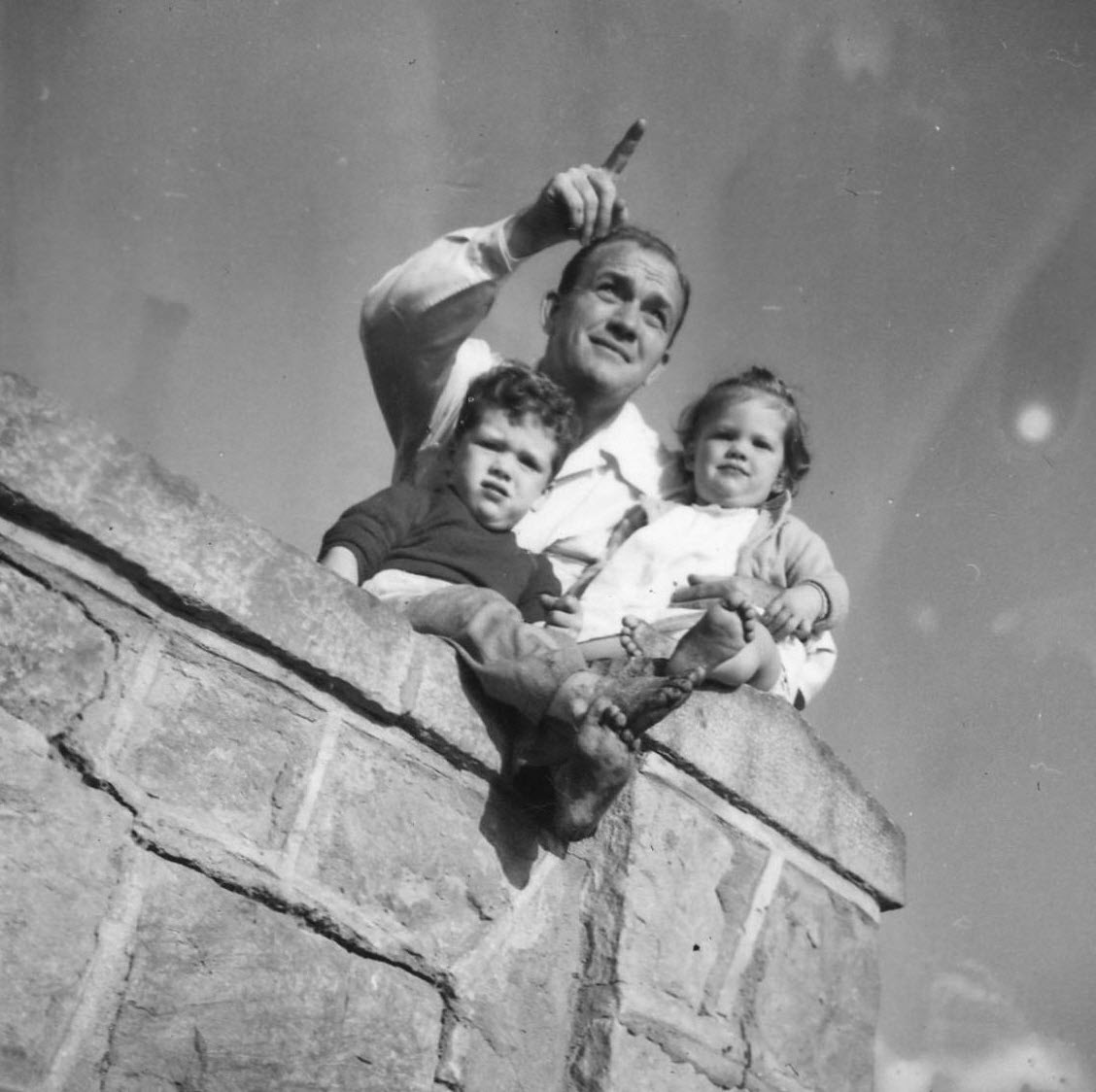
The family returned to Yakima from Peru. Dad took a job as a car salesman at Wikstrom Motors, the local Buick dealership. The owner, Dick Wikstrom, was a private pilot, so Dad's flying experiences would have given them something in common.
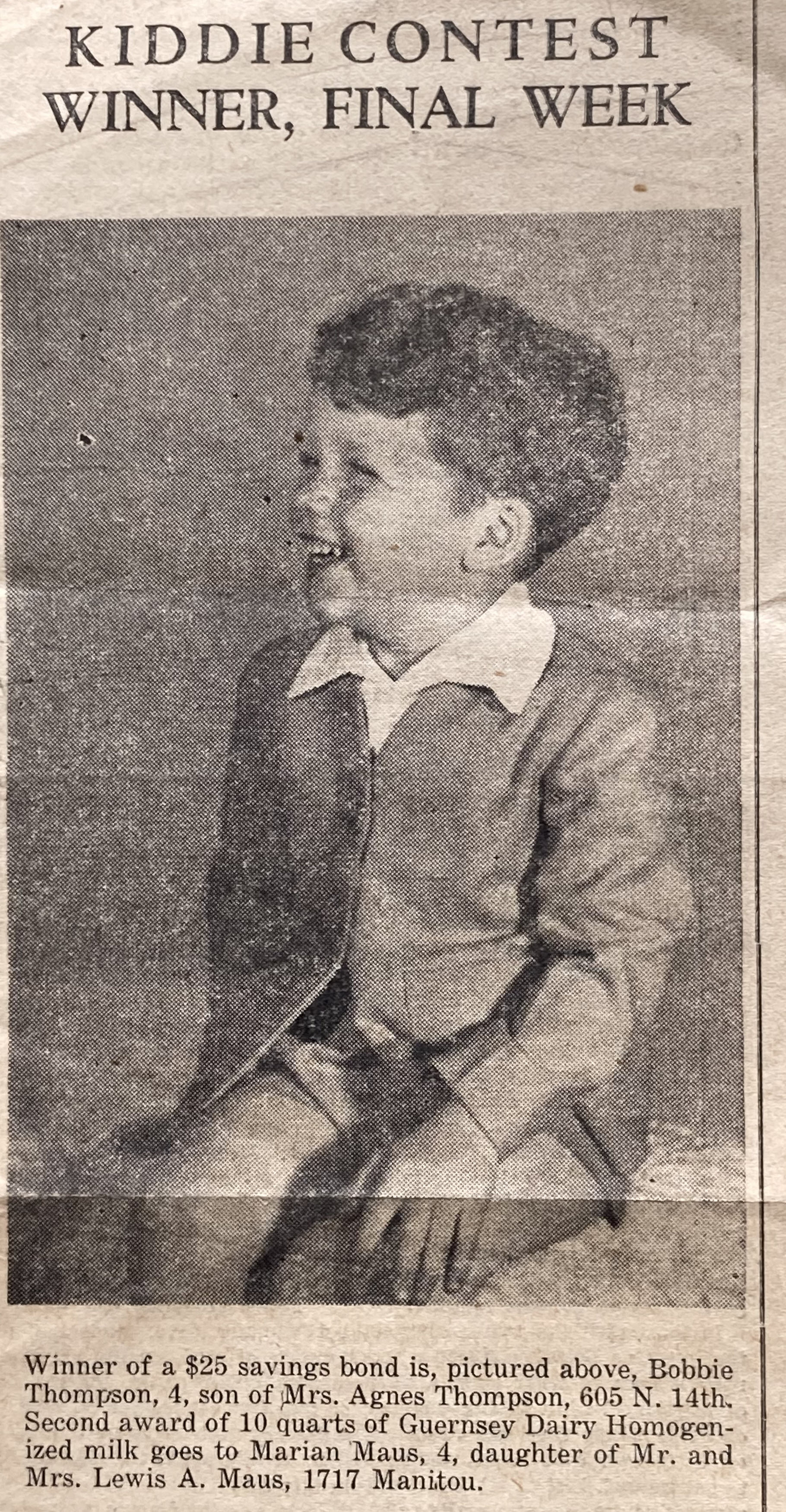
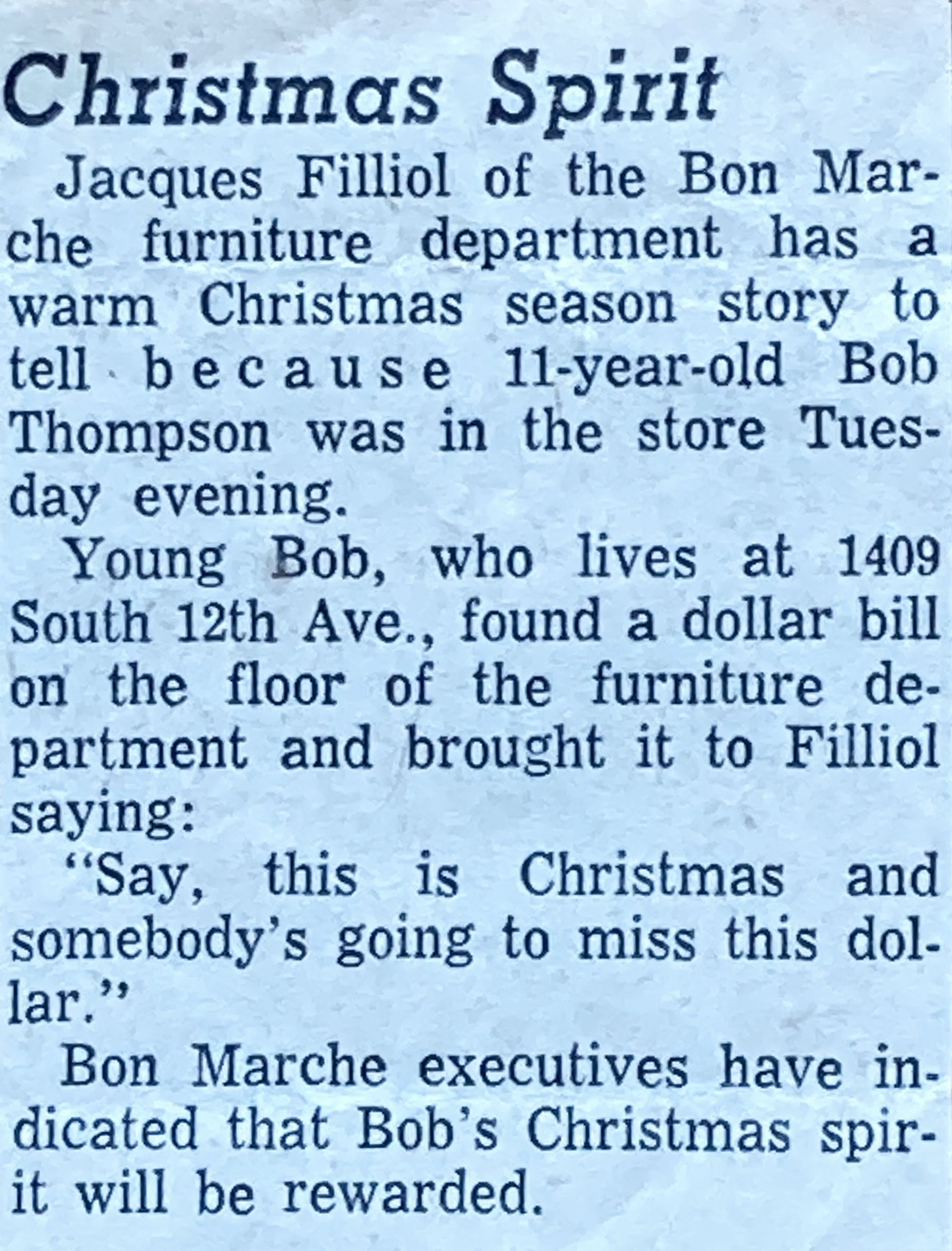
Bobby and Susan went to grade school at St. Paul's School. In 1954, the year that I was born, Mom and Dad bought a newly-built house at 1409 South 12th Avenue, about halfway between city center and the airport.
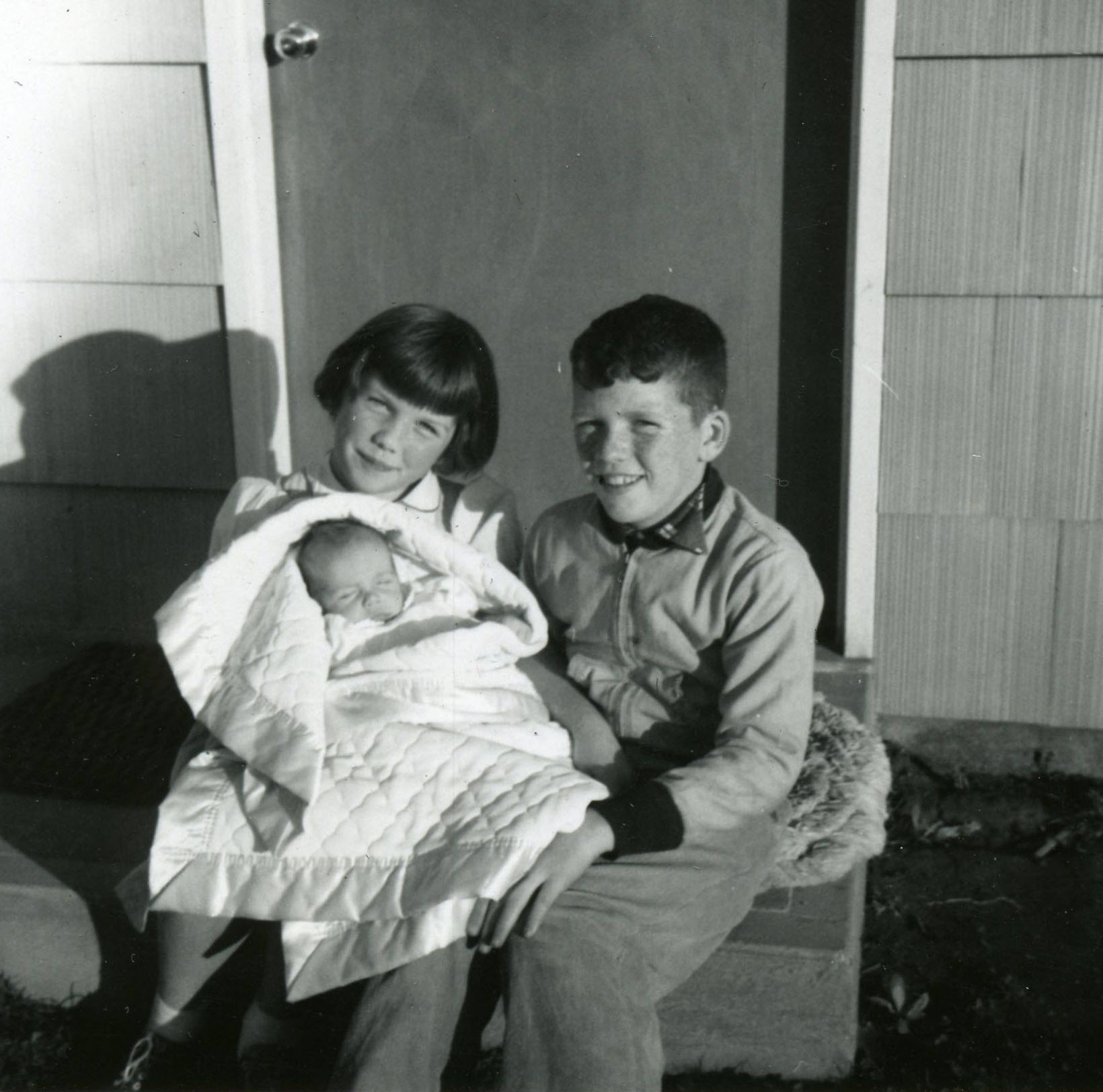
I was too young to be in on all of the action, but I think this was a great period for the young Thompson family with lots of other family members nearby. Mom's mother, Grandma Ellen McFadden, was in Yakima. Mom's sister, Helen, her husband, Jimmy, and their children Frank and Eileen, who were Bobby and Susan's age, were in Yakima too. With Mom's two brothers living in Kennewick and most of Dad's family in Boise, there would have been lots of cousins, aunts, and uncles to have fun with. Pictured below are Bobby and his cousin, Frank O'Hearn on the patio behind the house.
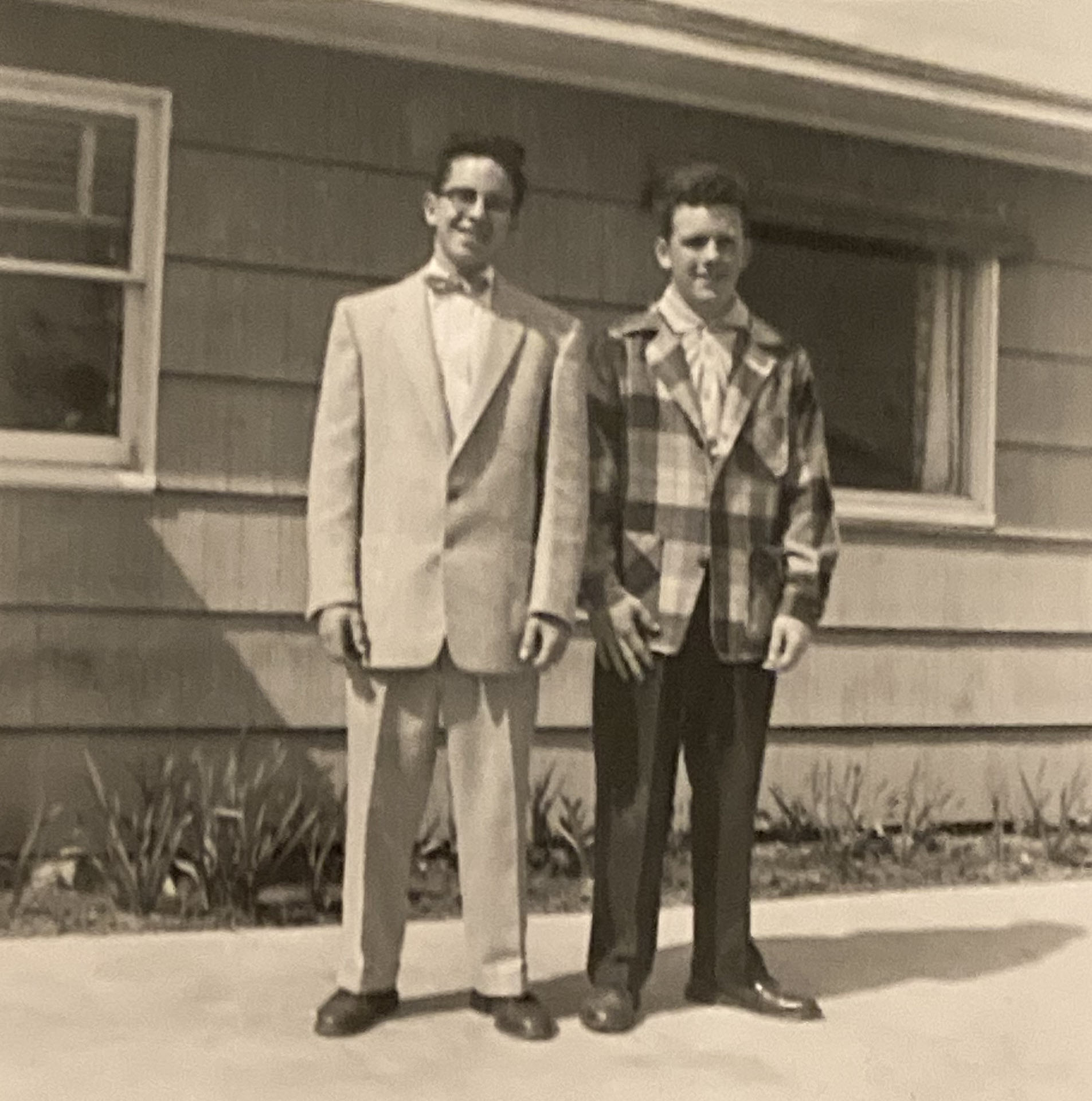
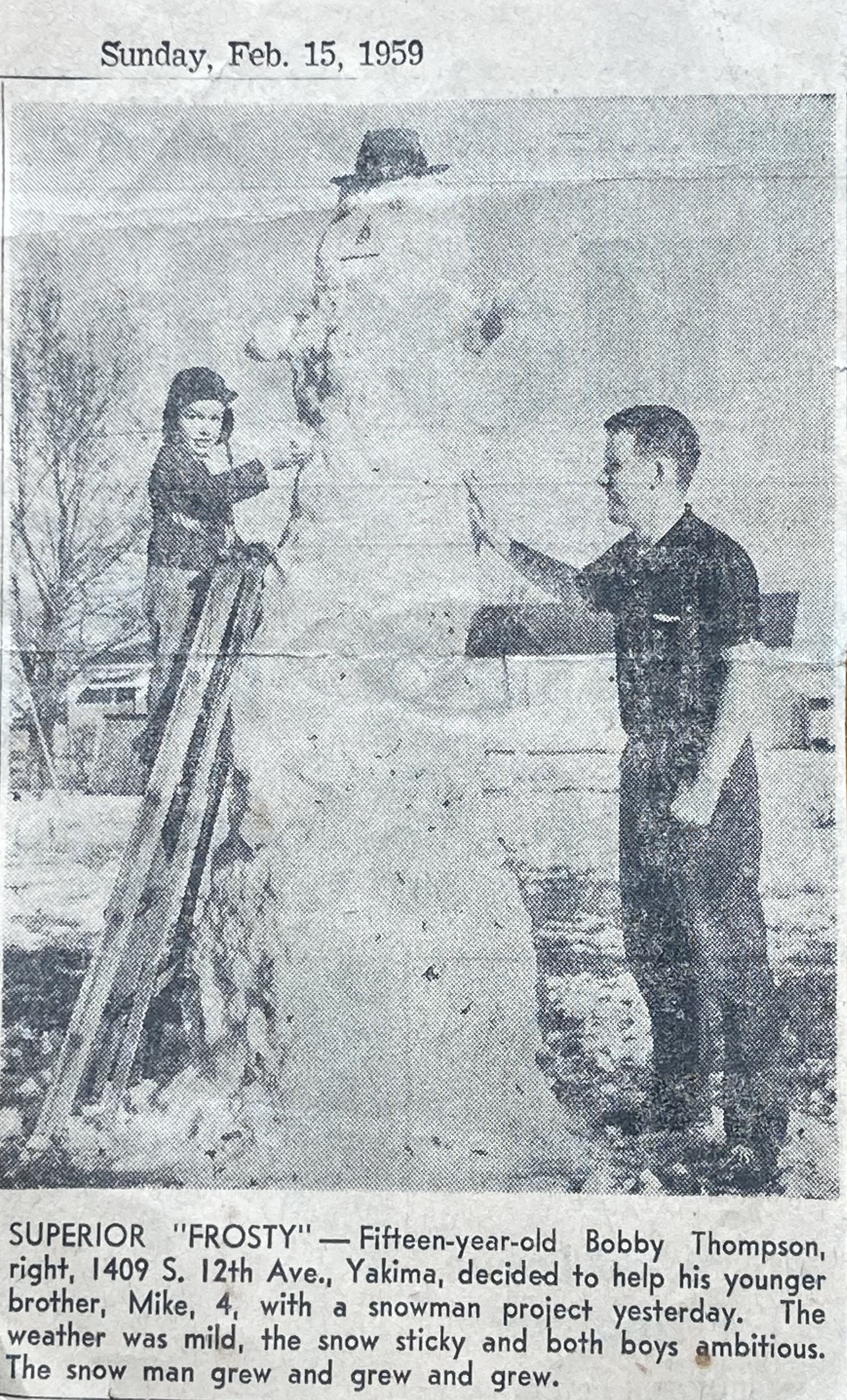
Then Dad took another flying job, this one with with Wein Airlines in Alaska. So the Thompsons packed up and moved north to live, first in Nome and then in Fairbanks. Alaska would have been an exciting place to be if you loved an outdoor life in those days when it was known as "The Last Frontier" for good reason. Susan recalls seeing the Eskimos paddling their umiaks across the Bering Sea to Nome, from their home out on King Island, and living on the beach while they traded for supplies.
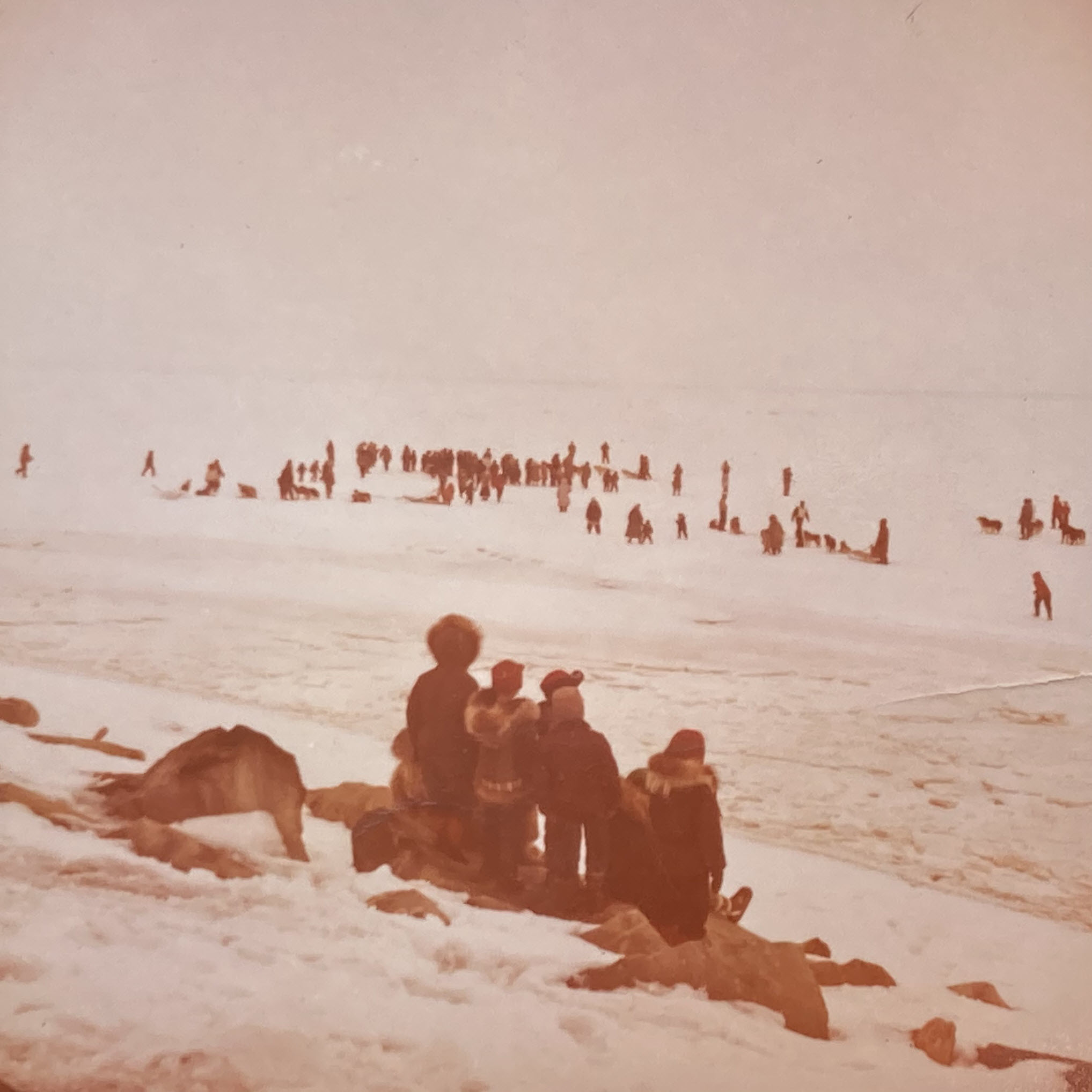
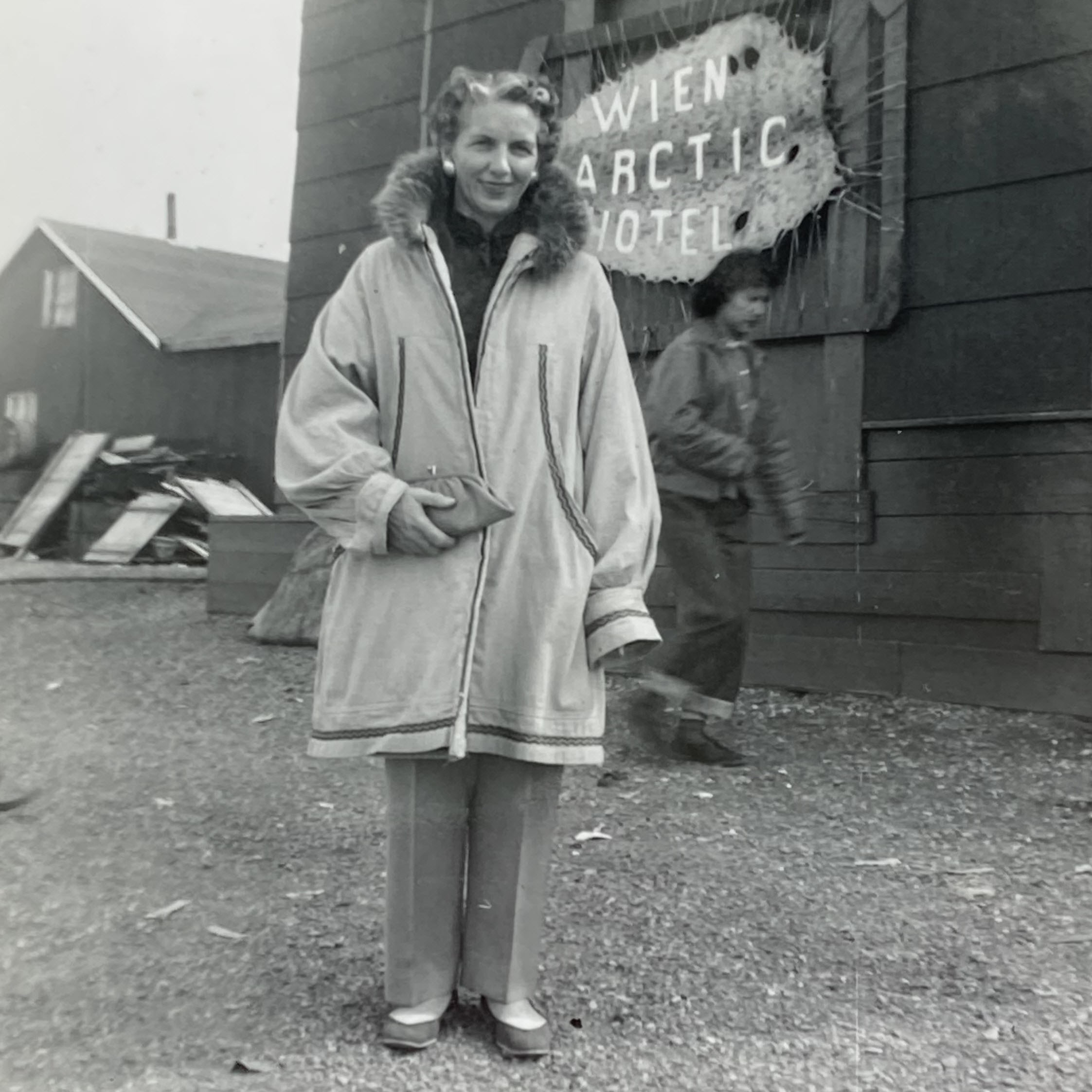
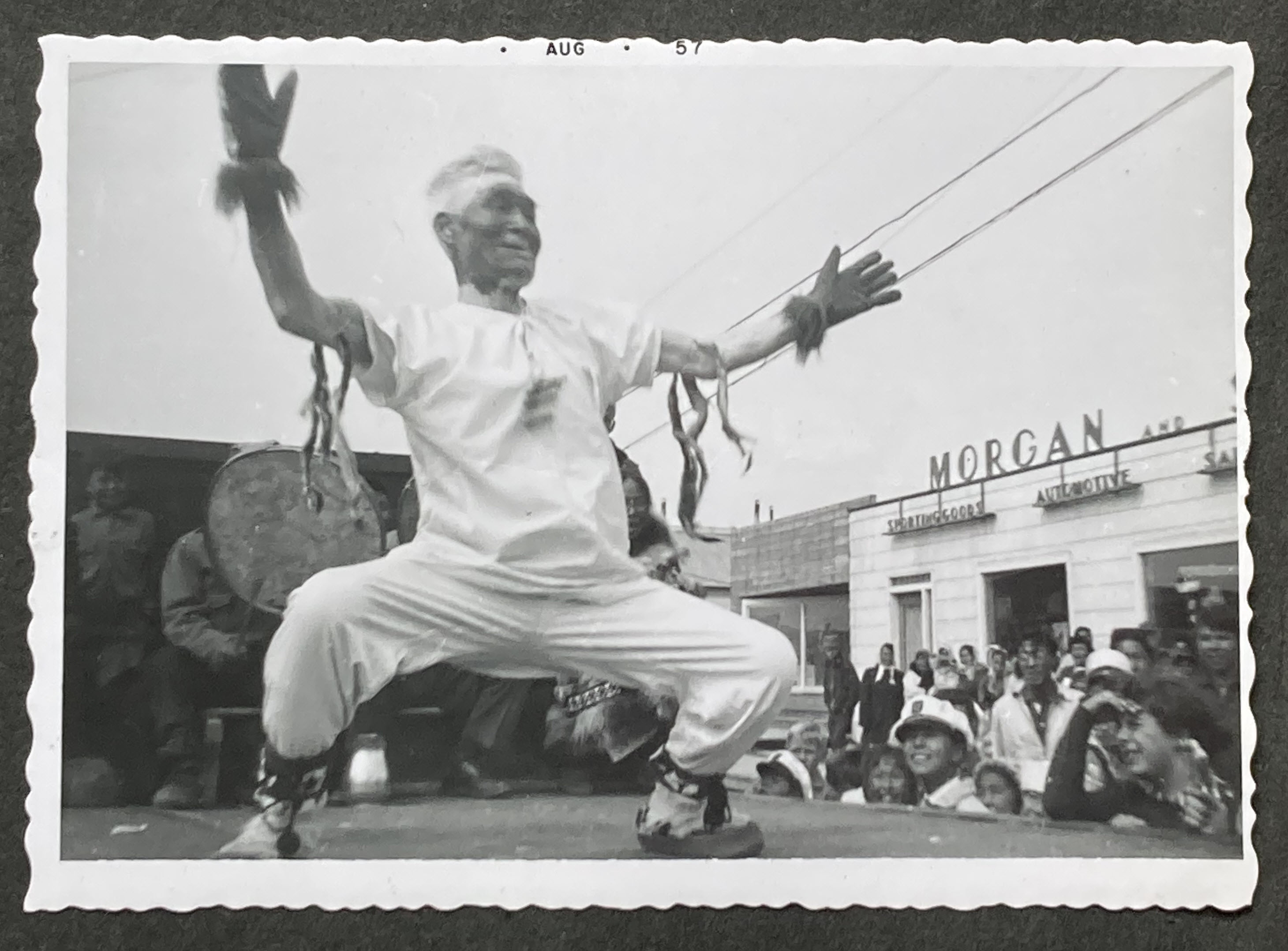
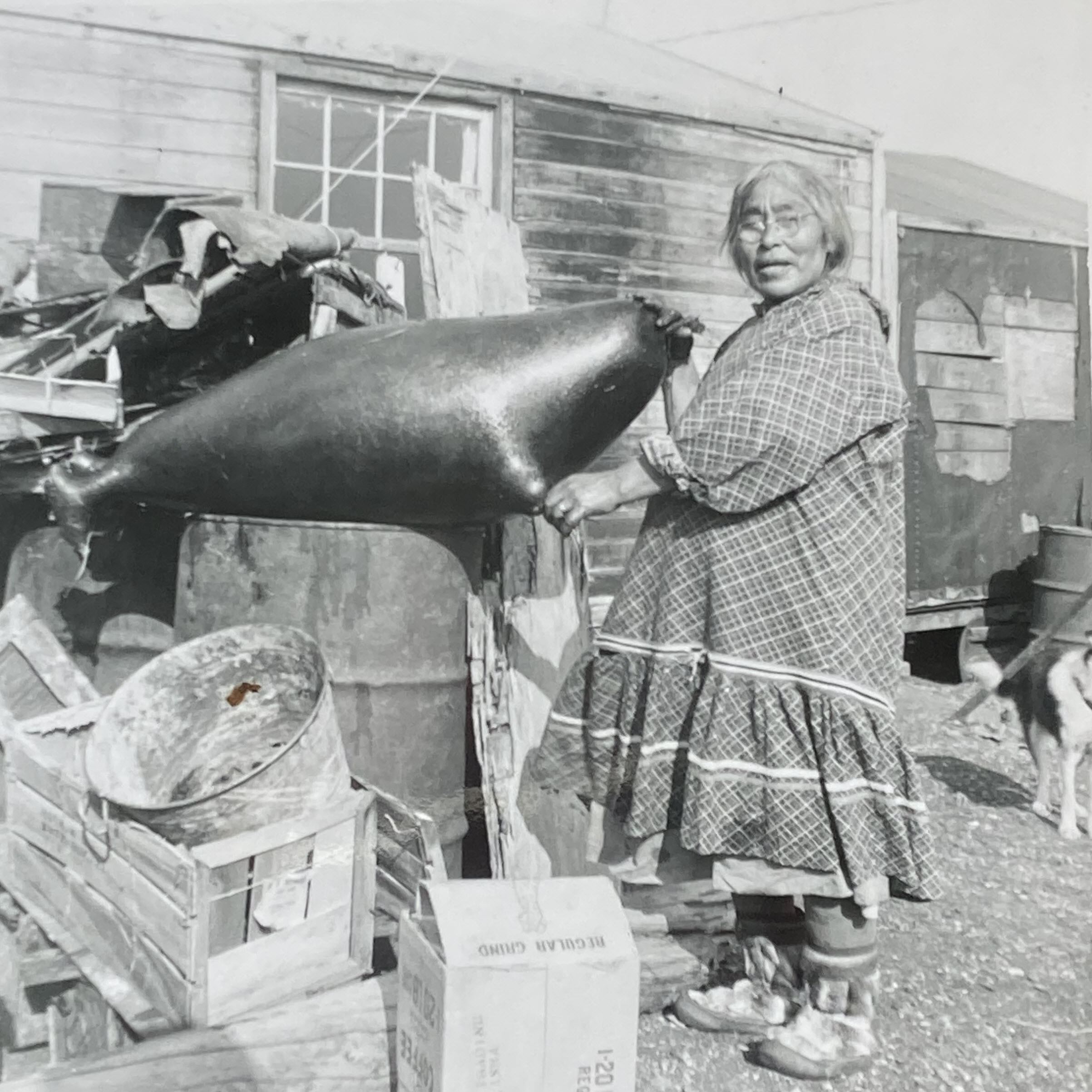
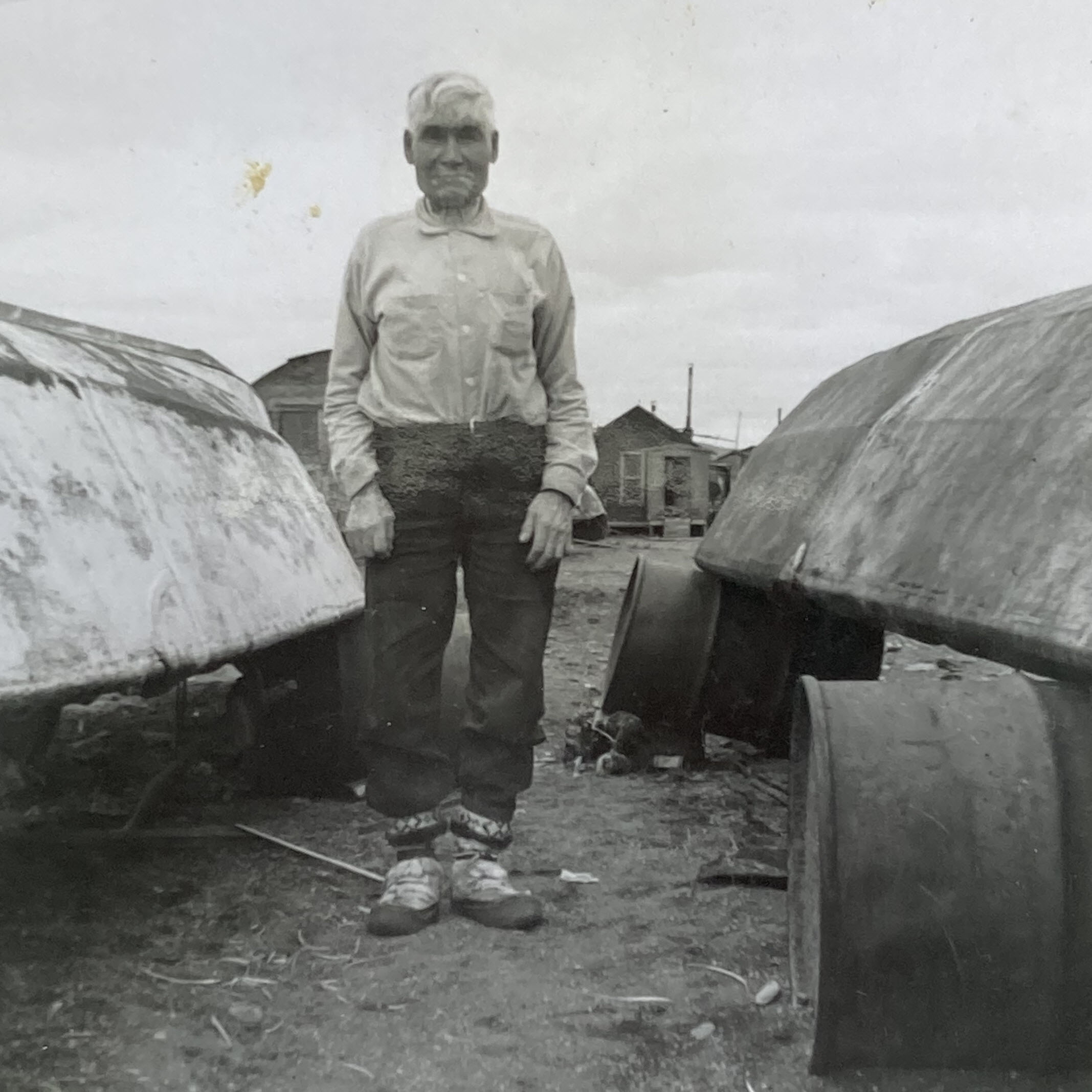
There was hunting and fishing, which both Dad and Bobby loved. There were trips with Dad to Circle Hot Springs in the Beech 18 that he flew for Wien, where we swam in the hot pools and panned for gold. There were trips to the lake in the summer with Bobby's high school girlfriend, Kerry Simmons, and her family.
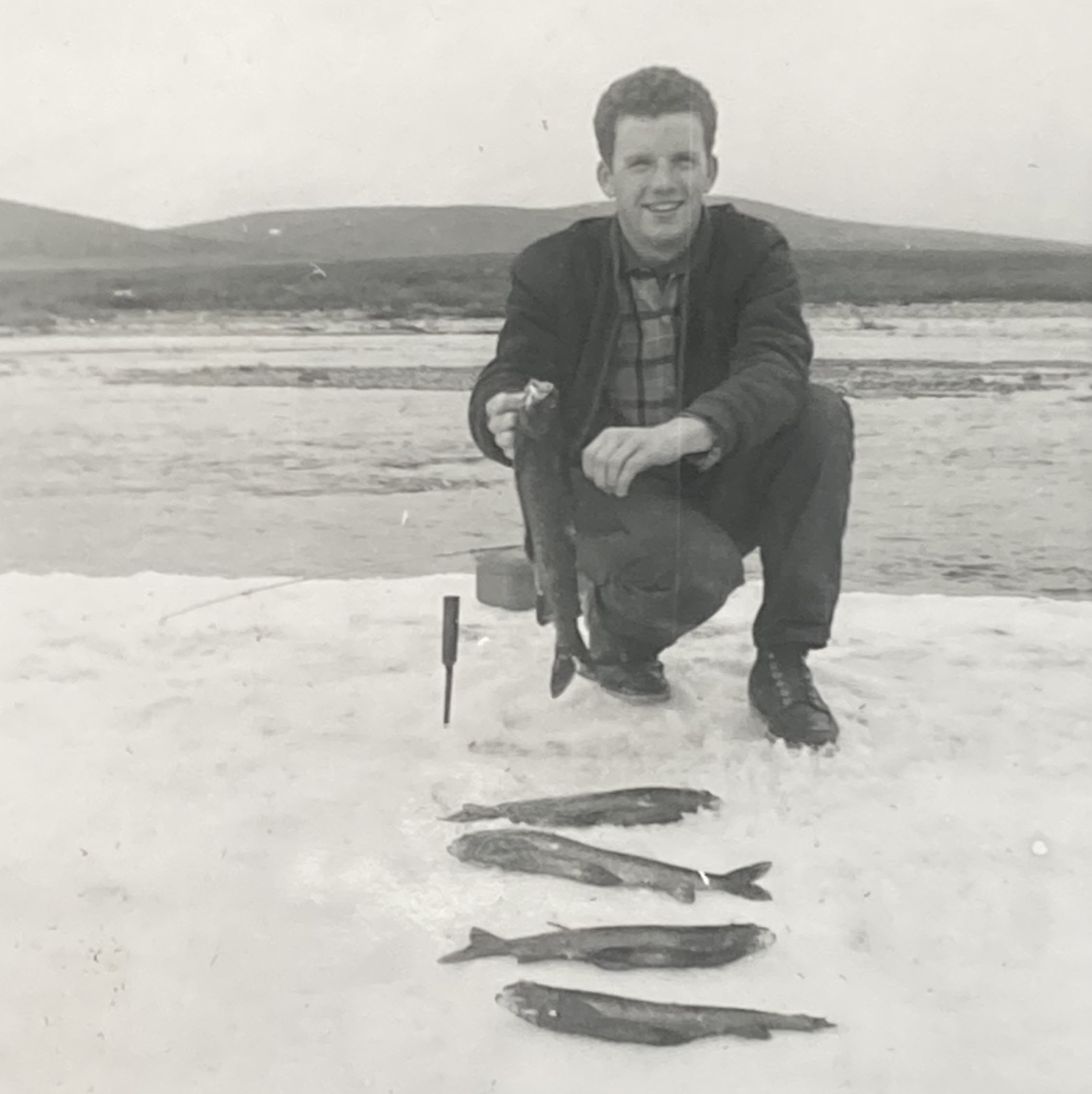
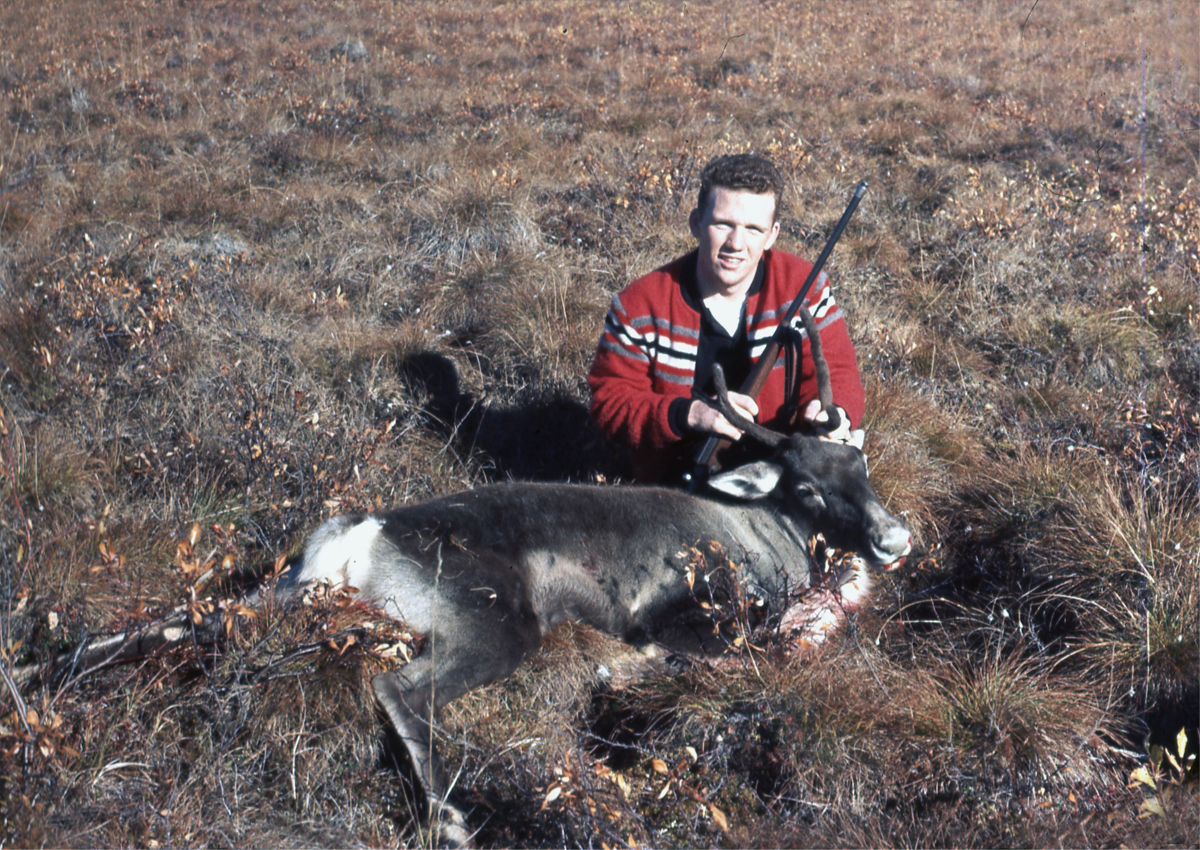
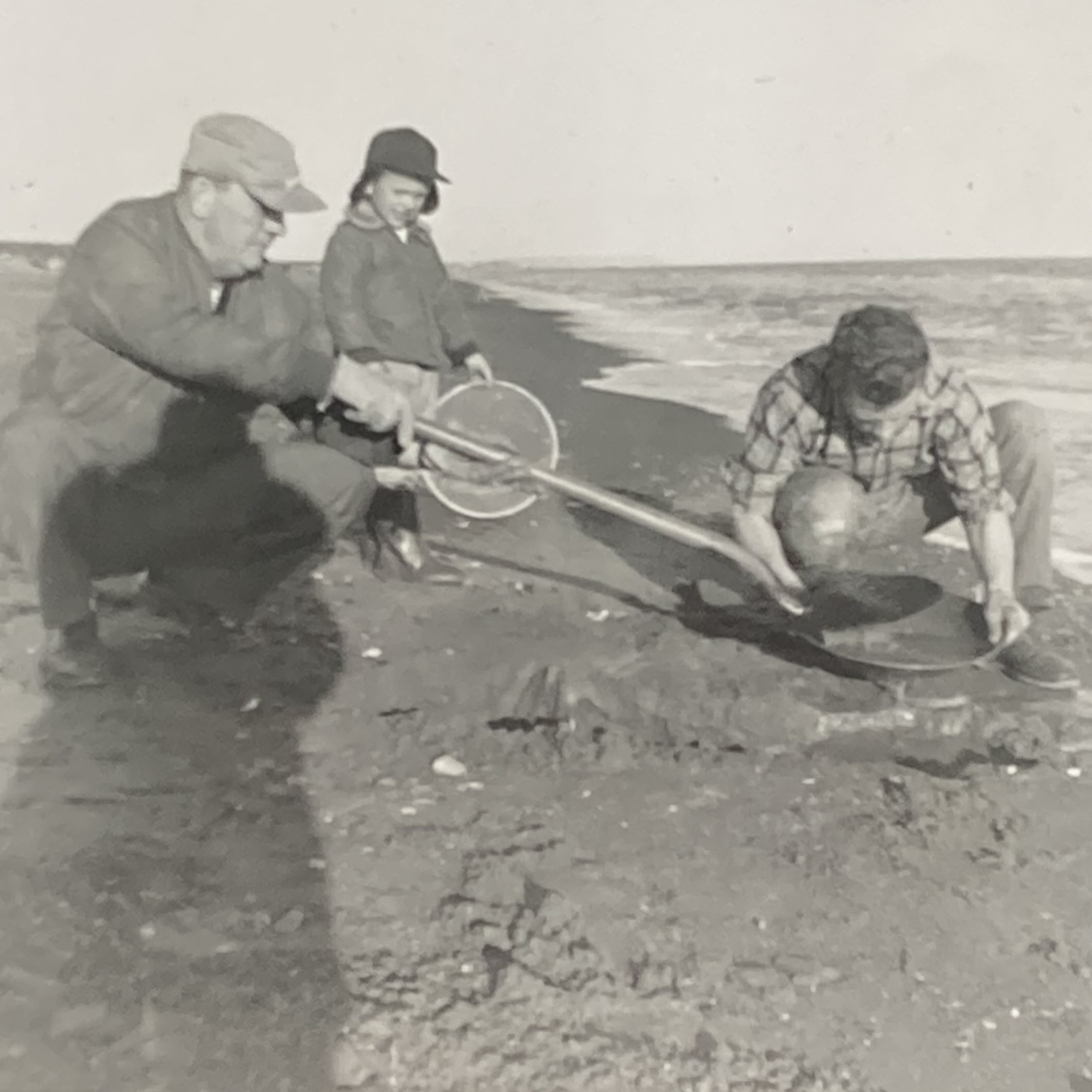
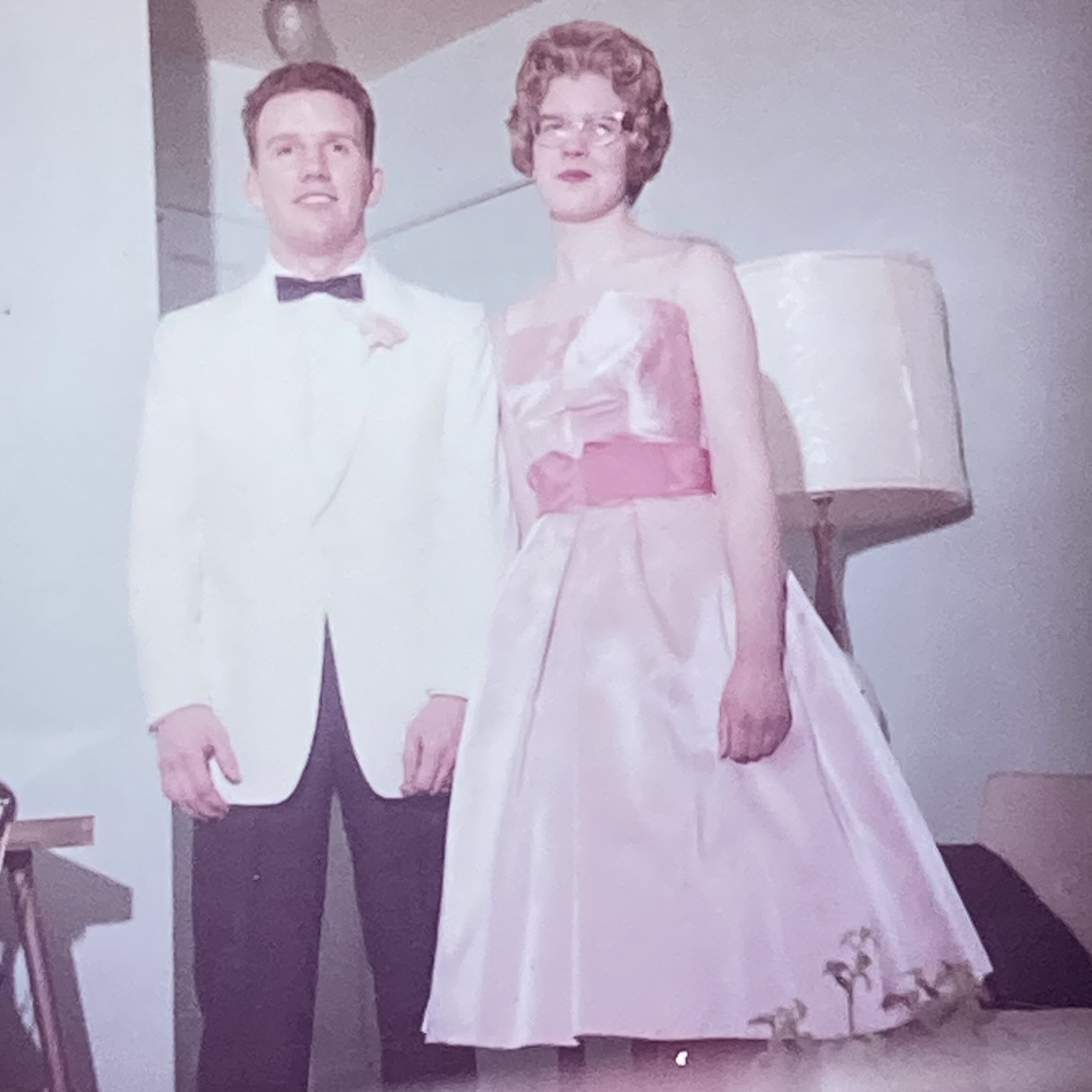
But Alaska also meant tough living conditions. Nome was way out there in the late 1950's. In Fairbanks, where I attended Kindergarten at Denali Grade School, the temperature sometimes reached 50 below zero in the winter, with just a couple hours of sunlight. By 1960 Mom had reached the limit of her apetite for Alaska and she, Susan and I moved back to Yakima, while Dad and Bobby remained in Fairbanks year-round. For the next couple years Mom, Susan and I would fly up to Fairbanks for the summer, then fly back to Yakima for the start of the school year.
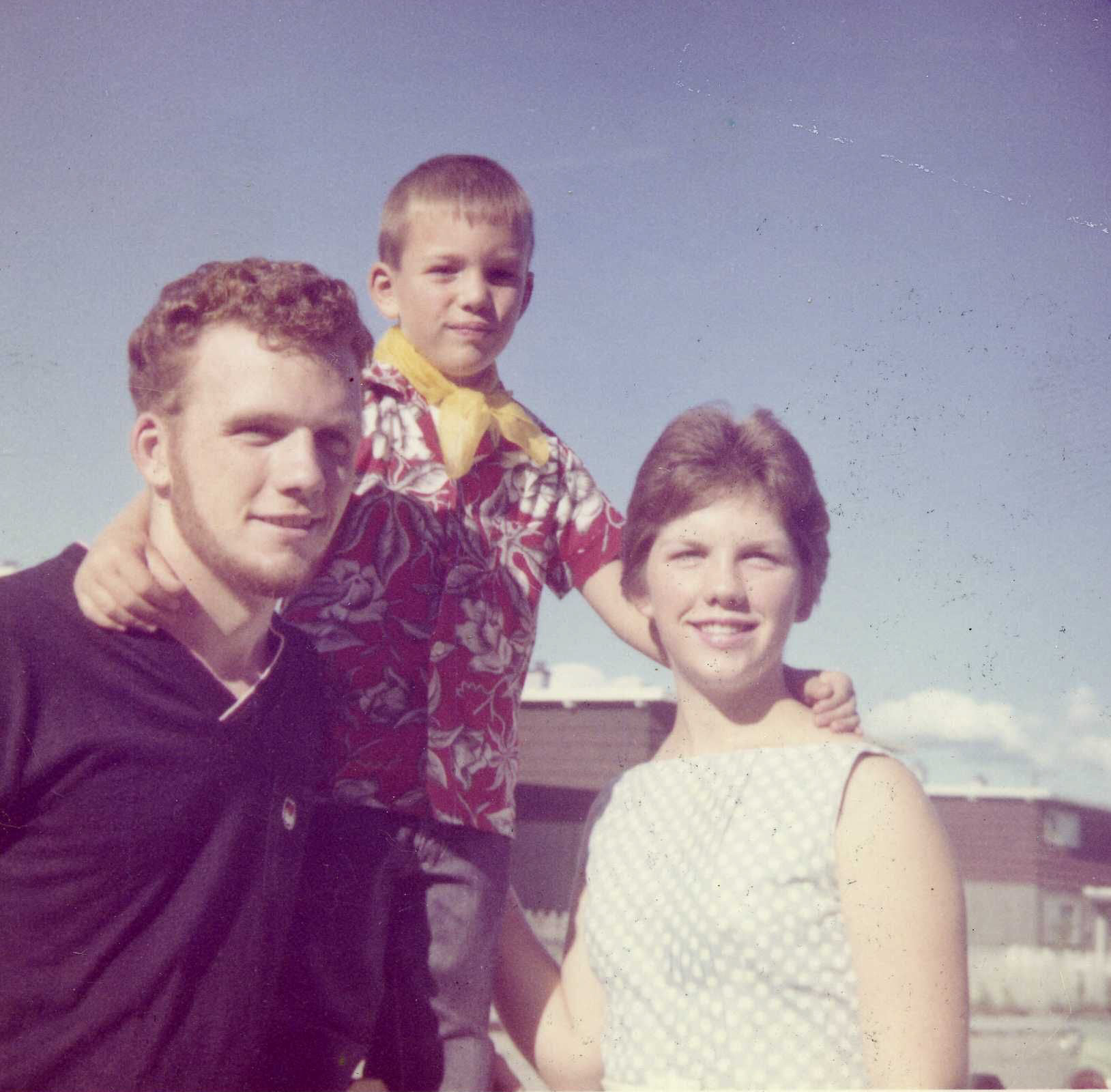
I was ten years younger than Bobby, so my life didn't have as much overlap with his as is usually the case with brothers. One of my early memories of Bobby was going hunting with him, which would have either been while I was in Kindergarten at Denali School in Fairbanks, or more likely during summer vacation when I was in first or second grade at Hoover School in Yakima. Bobby had taken a summer job in Umiat, a remote airstrip above the Arctic Circle between Point Barrow and Deadhorse. Bobby was a ham radio hobbyist and he had worked at the television station in Fairbanks. He was hired to work with the radio communications equipment at Umiat. Dad must have flown me into Umiat (it was truly in the middle of nowhere, and not reachable by road) and dropped me off to stay with Bobby for a few days.
You didn't need to look far for caribou at Umiat - they came walking right through camp. I remember going a short way from the airstrip through the rolling tundra until Bobby saw a suitable caribou. He propped our old, Spanish American War-vintage 30.40 Krag on his shoulder, as I was too young to be able to hold the rifle up on my own. I managed to hit the caribou in the back, which downed it. (Dad and Bobby, both avid hunters, used to take me to shoot tin cans with a .22 in Fairbanks, so I could actually hit what I was aiming for at a very young age.) The recoil from the big rifle downed me too, and I had to pick myself up off the ground to see that my shot had hit the target. Then Bobby handed me our First World War-vintage Colt .45 revolver to administer the coup de grace. My first shot ricoched off one of the horns, luckily not hitting either Bobby or I. I can't remember if Bobby gave me a second try, or if he just finished the job himself. Then he did the skinning and cleaning. In Alaska in those days, many people rented walk-in freezer space for the deer, caribou, and moose they shot and the fish they caught, rather than buying their meat at the grocery store.
Bobby loved cars and going fast. I remember watching Bobby and his cousin, Frank O'Hearn work on an early 1950's Chevrolet, which was his first car.
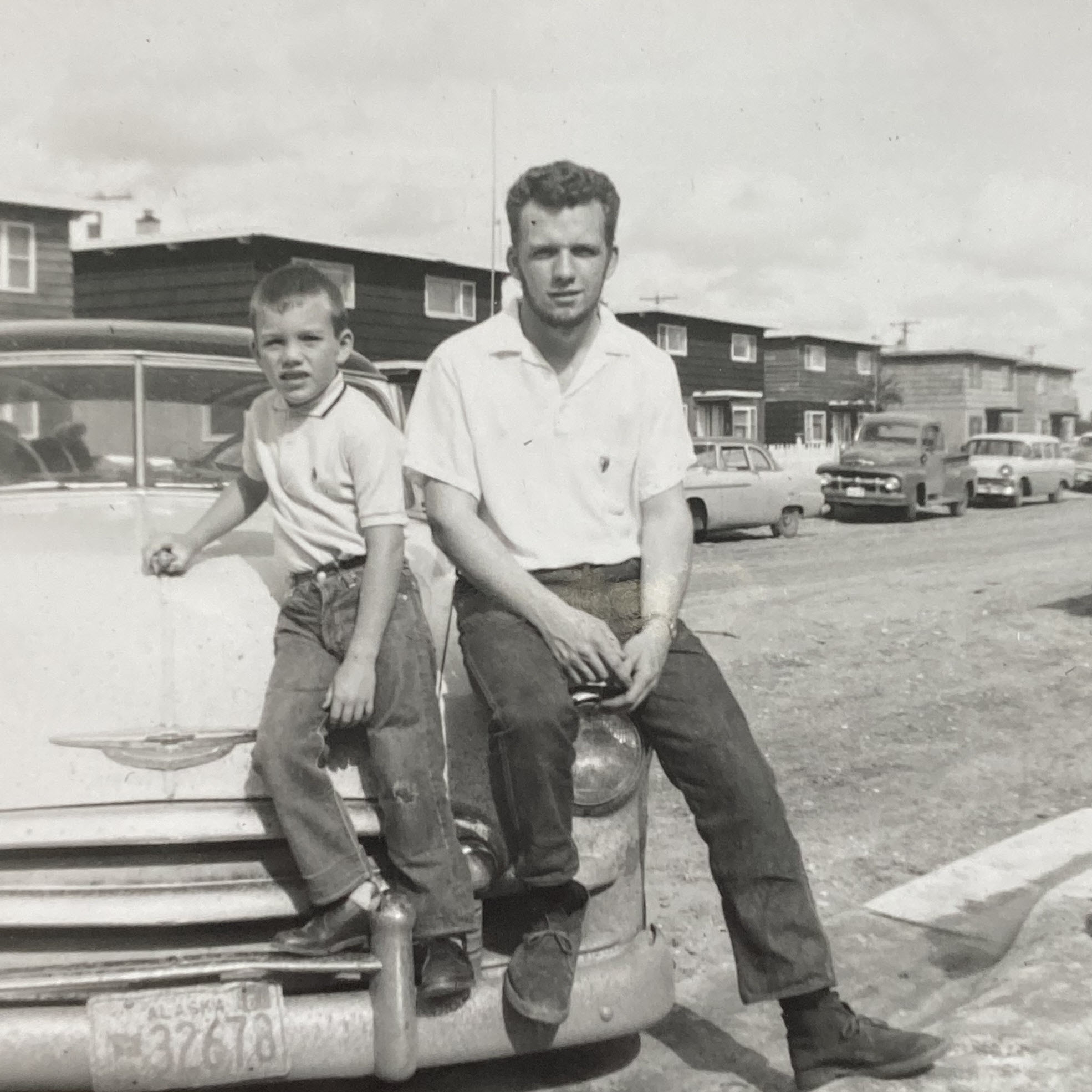
His love of speed nearly cost him his life. He was riding with a friend that owned a Jaguar when the car left the road going an estimated ninety miles an hour. Bobby suffered deep cuts on his face and neck. I remember us sitting in the waiting room in the hospital in Fairbanks, standing by for news from the doctors. Both Bobby and his friend survived the wreck, but the scars from it were visible on Bobby's face ever after.
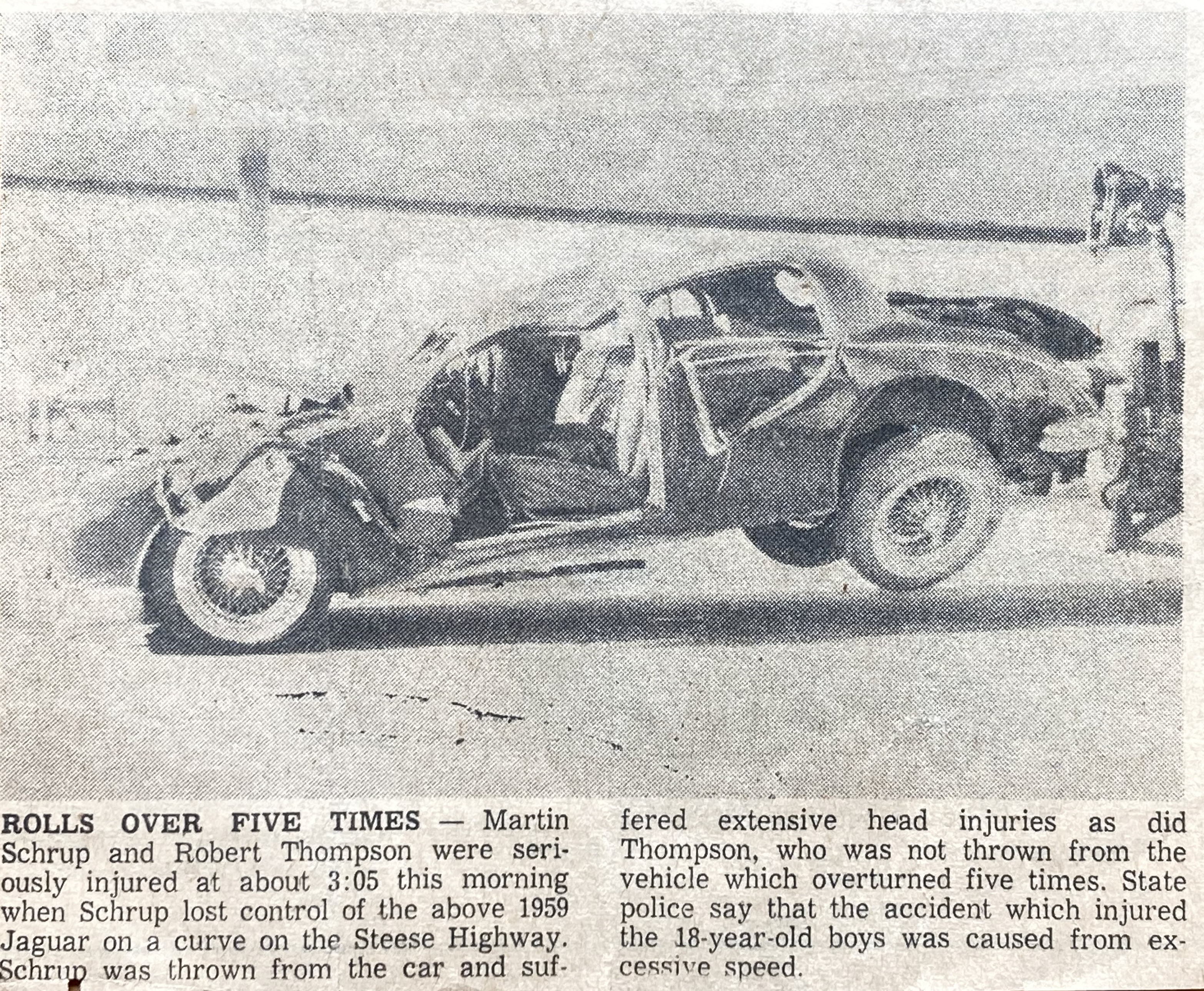
After graduating from high school in Fairbanks, Bobby started college at the University of Alaska. It was at the beginning of his second quarter there, in January of 1963, that Dad died in a plane crash at Barter Island. Bobby left school and took a job handling air freight for Wien Airlines. He bought a Corvette, and would later buy a later-model Corvette Sting Ray. He also had a quarter-mile dragster, with a big, souped-up motor installed into an older car's body. Cars and drag racing were a big part of his life during these years. I have a memory of Bobby driving me to grade school in his red, split-window, 1963 Corvette Sting Ray, which he had driven down the Alcan Highway to Yakima. He let me off right by the baseball diamond just before school, where all the other boys could see, and I'm sure I was walking proud on the playground that day!
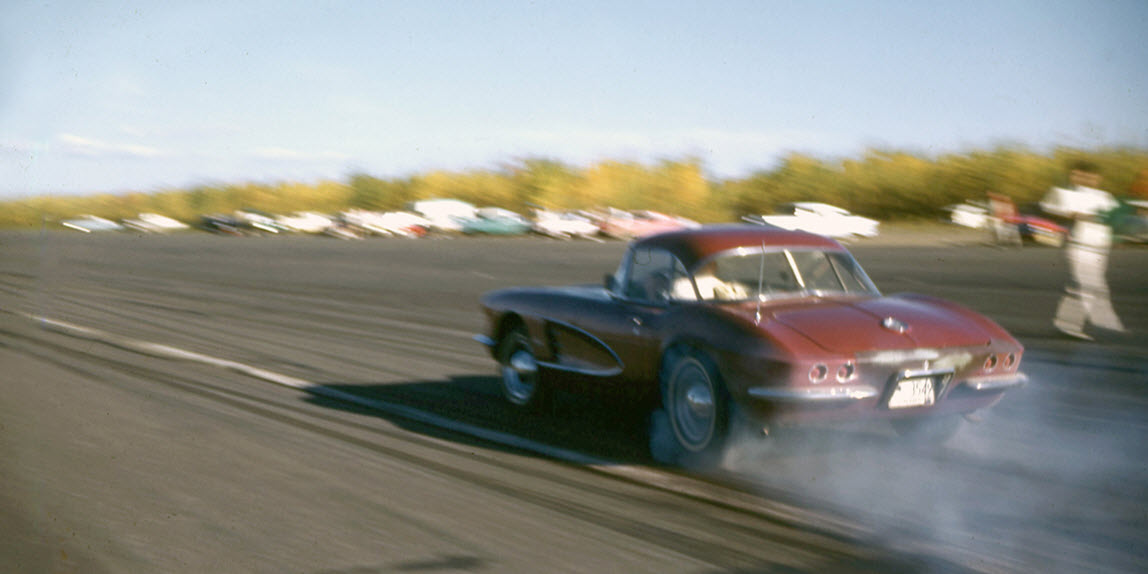
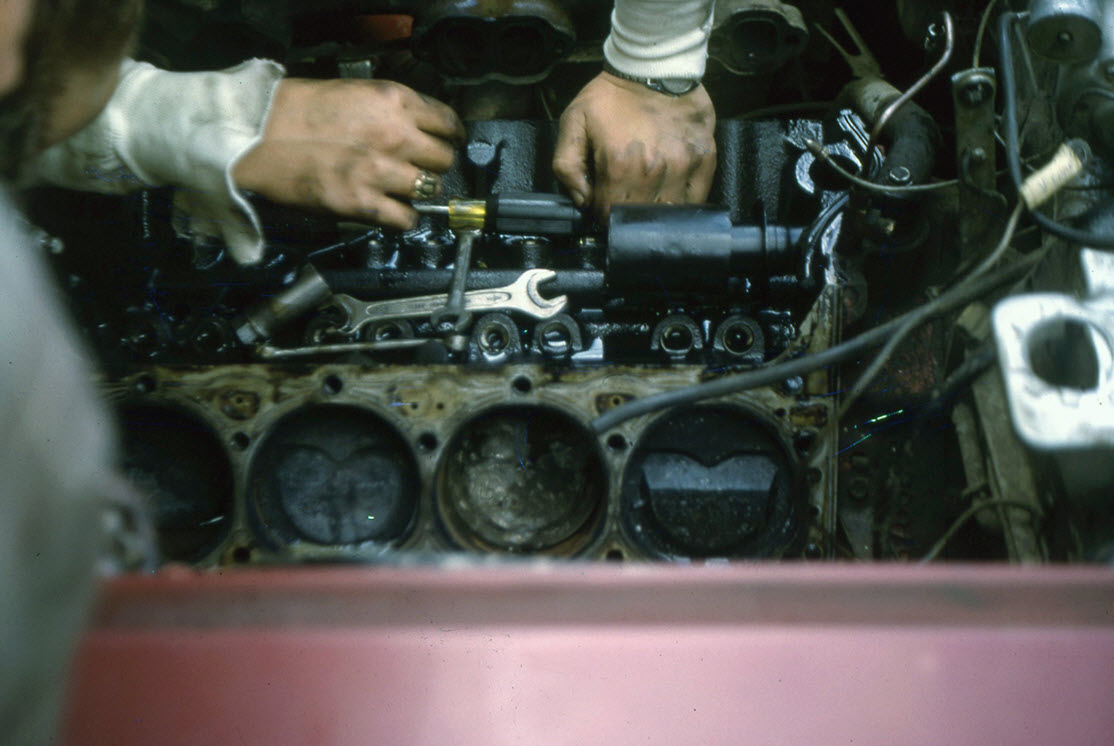
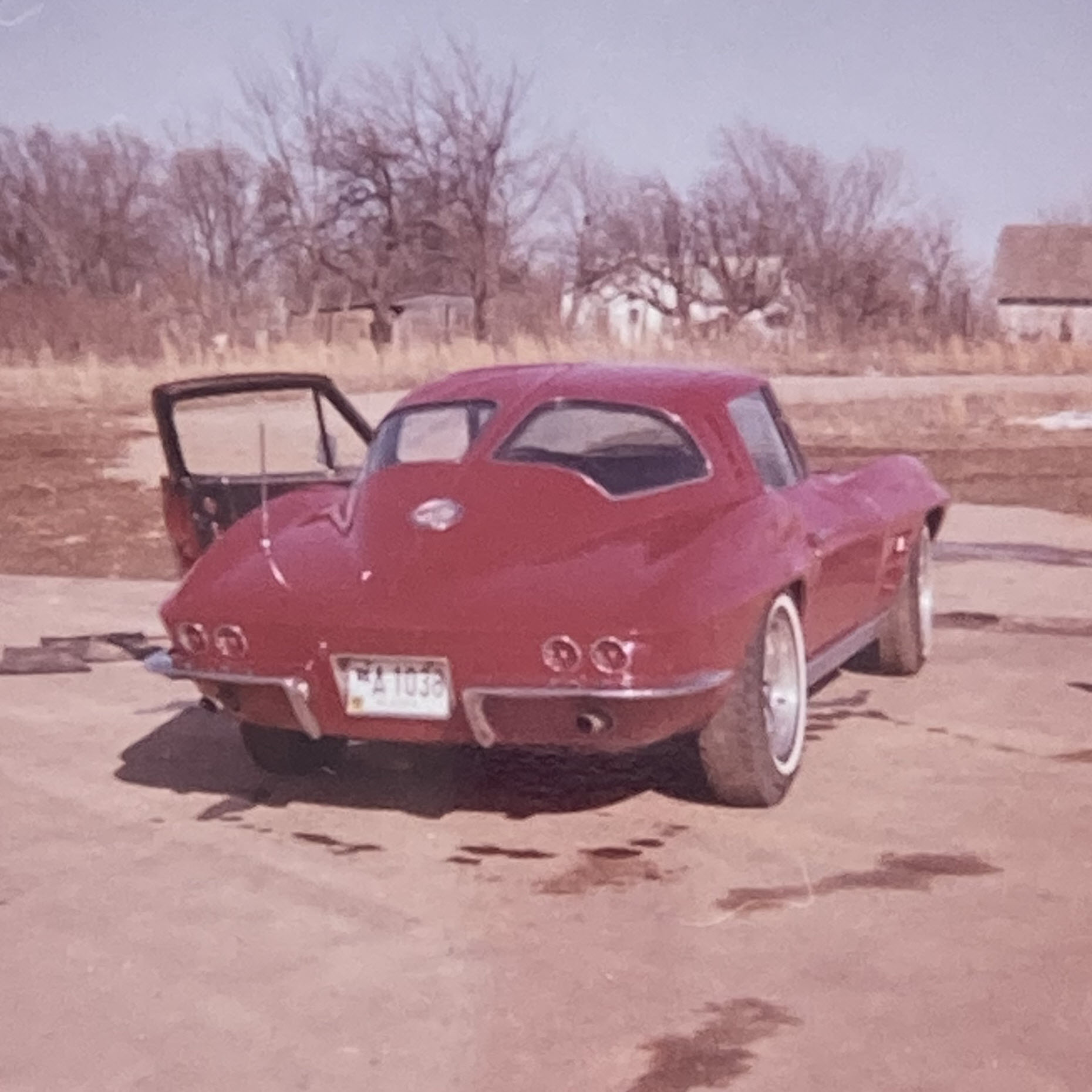
In late 1964 he did a short stint in the Alaska National Guard and went to Army boot camp at Fort Leonard Wood in Missouri, where he won his unit's award for marksmanship. Then he spent some time in Anchorage, likely still working for Wien there.
In the summer of 1965 he went to Honolulu, Hawaii, where he spent six months, and from there he went to New Zealand. I've no idea what prompted Bobby to travel to New Zealand, where he spent the next two years. He got a job there with Air New Zealand at the Auckland airport, probably based on his air freight experience with Wien in Alaska. While in New Zealand he began learning to fly. In some of the letters that he exchanged with Mom during the period he tells of scraping together every dollar that he could to pay for flying lessons, initially in a de Havilland Moth biplane. He returned to the US in the spring of 1967 by coming back around the world, including stops in India and Moscow.
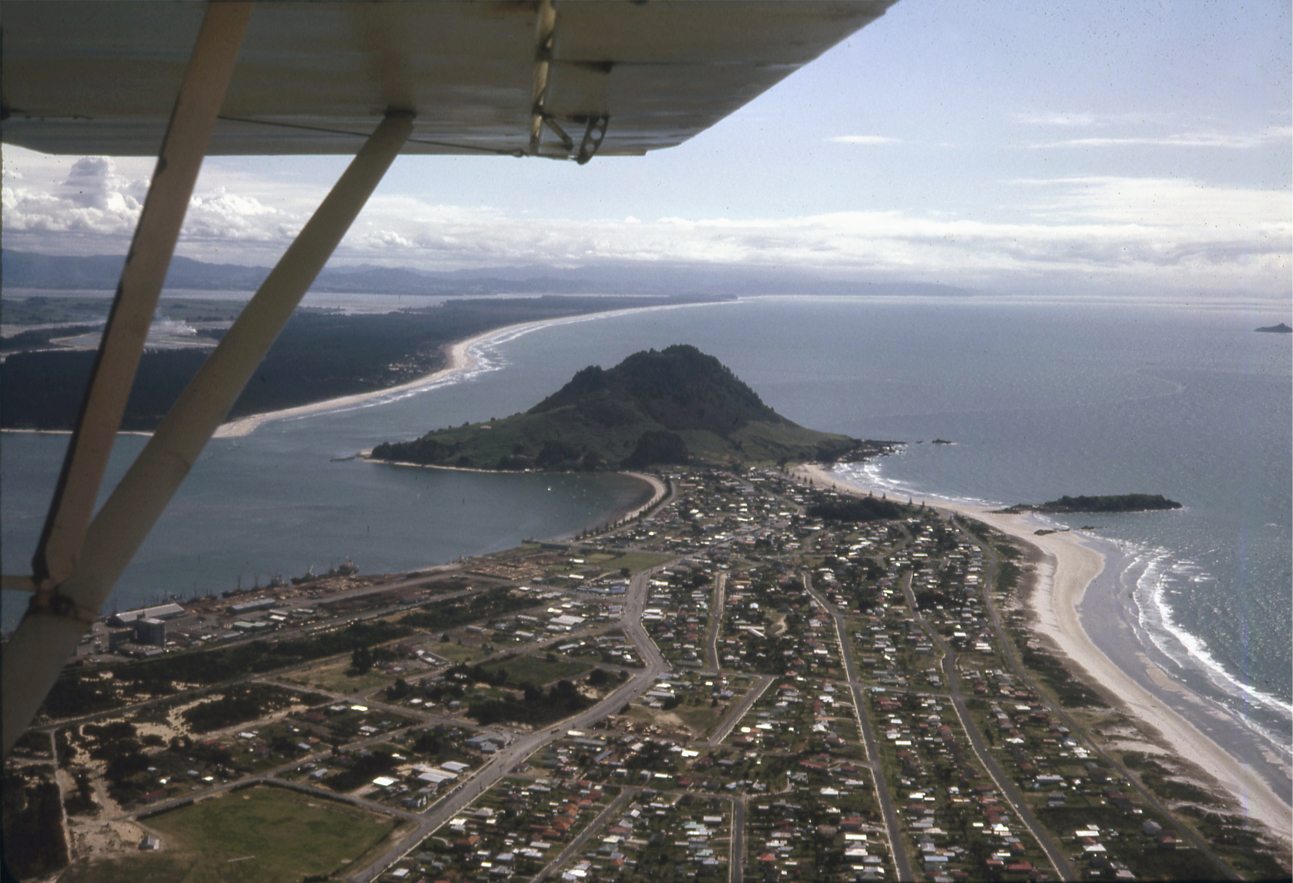
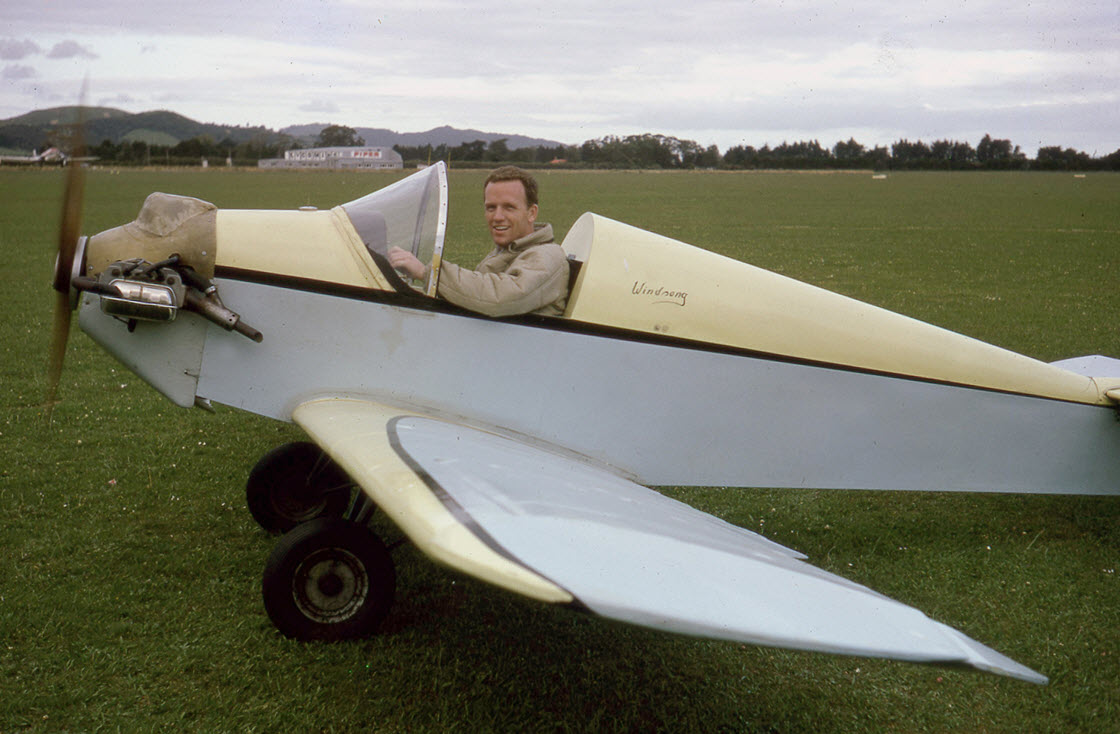
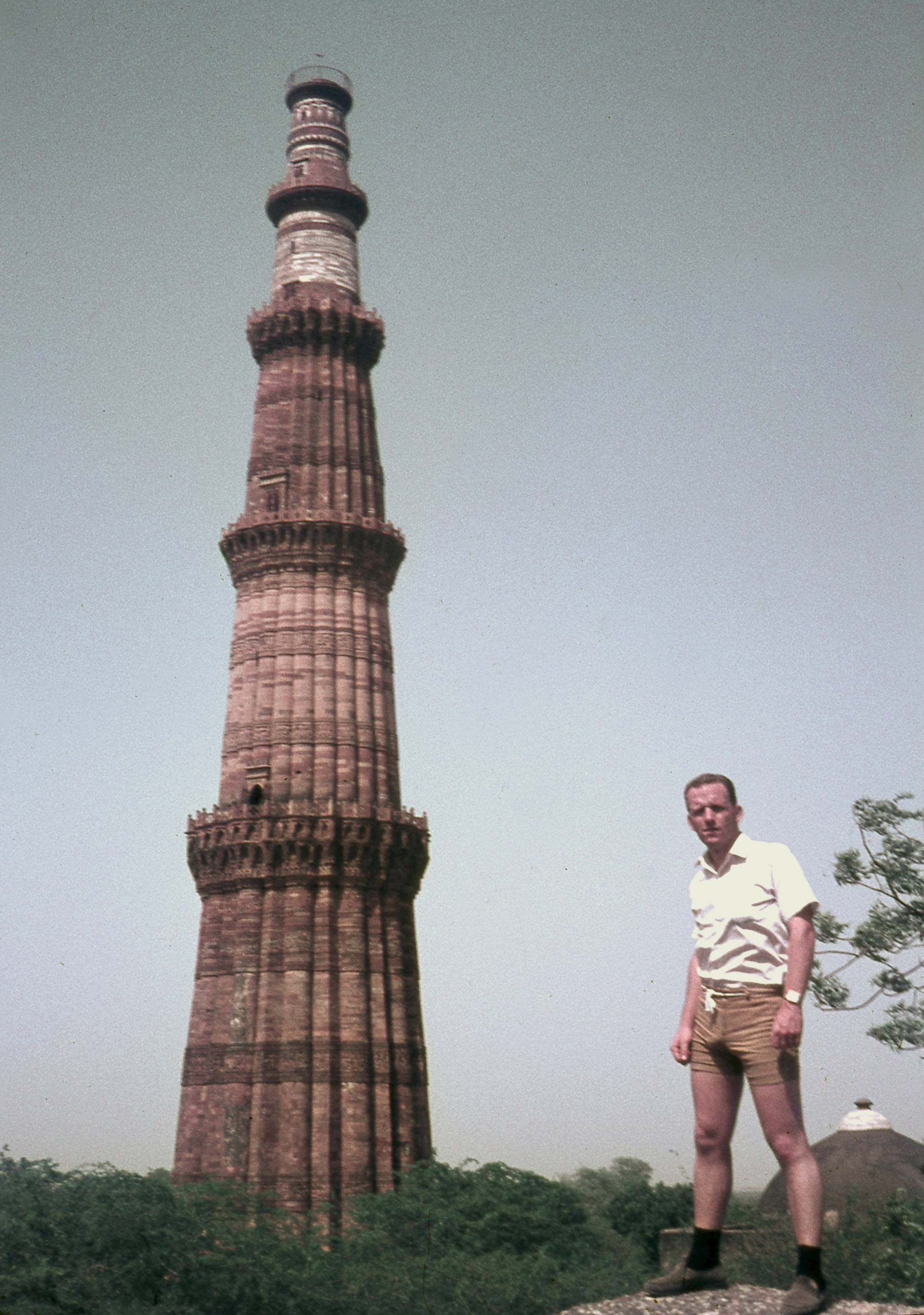
Bobby's time in New Zealand made a big impact on him. He raved about the wonderful people that he met there, including the very international group of young people that he worked with at Air New Zealand. At his suggestion one summer evening, when he was staying with us in Yakima, he and I donned our tennis shoes and ran from the house on 12th to Larson Park and back, a distance of somewhere around two miles. "Jogging", as he called it, was something that we had never heard of before. The notion that regular people would run long distances for fitness, as they were doing in New Zealand at the time, seemed very strange to us. In 1967, the distance running revolution was still many years off in the US.
He also came back home with the conviction that the US was wrong to take part in the war in Vietnam. That led to some heated exchanges between Bobby and Mom at our house in Yakima. The bulk of public opinion in this country was still strongly in support of the war effort, not surprising only two decades after the end of World War II, and a single decade after the Korean War. Once again, Bobby was ahead of us. In another year Bobby Kennedy would be assasinated before he could win the Democratic nomination for President on an anti-war platform, and the tumultious and divisive years of the Nixon Administration would begin. Before those years had ended, heated exchanges about the war had taken place in just about every living room in the land, and we were a nation divided. "The times, they were a-changin" in the mid 1960's, and Bobby also brought with him some new music. He had an album by a young woman named Joan Baez, and another by a scruffy-looking kid named Bob Dylan.
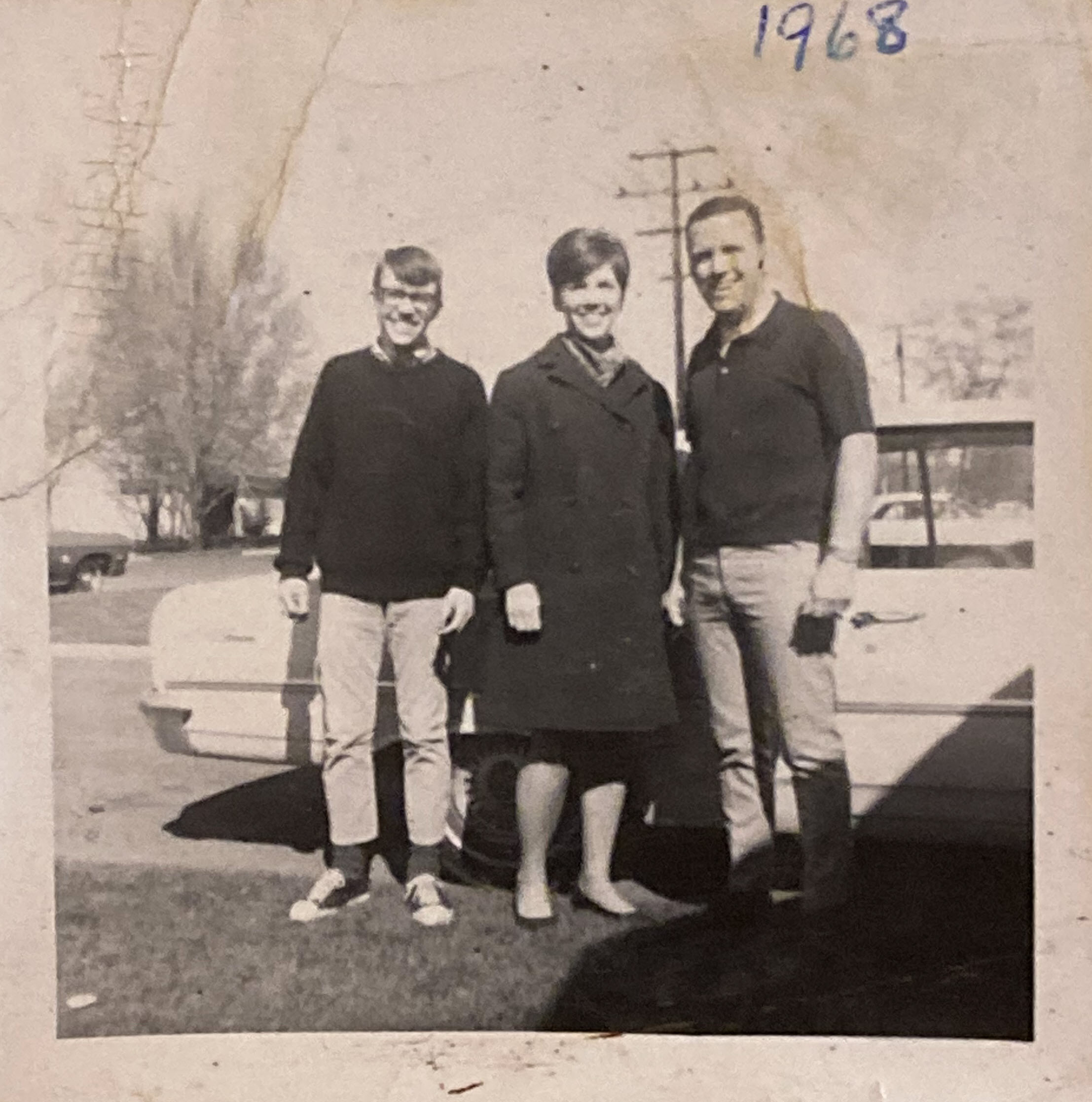
Bobby took a job with Floair in Wichita, Kansas, which was the site of the Cessna airplane factory. Floair's business was to deliver Cessna planes from the factory in Wichita to the plane's buyer. Flying for Floair was a way for Bobby to log lots of flying hours and improve his credentials, aiming toward better flying jobs in the future, and possibly with the airlines one day. When possible, he took delivery flights that would bring him through Yakima. I remember him picking me up and taking me along on some of his delivery flights to Seattle, from which we returned to Yakima by Greyhound bus. Bobby would sometimes let me fly the plane, and I logged sixteen hours of flying time in my own pilot's log book.
One day after school during the spring of my 9th grade year Bobby called from Wichita and I picked up the phone. He said that the next day he would be leaving on a delivery flight to British Columbia, and that he would be stopping in Yakima on his way north. I conveyed the message to Mom when she returned home. The following afternoon I was called away from PE class to the school office. Mom had called school to confirm that Bobby told me that he would be in Yakima that day, because she had not yet heard anything from him. Thus began our wait for word of Bobby's whereabouts. The wait would last three long and terrible days. As word spread that Bobby was missing, friends, neighbors, and family stopped by our house to offer their company and bring food. The wait ended with a policeman's knock on the door and the news that Bobby's plane had been found in southern Idaho, where he had crashed into a mountainside. At age 23, with most of his life still ahead of him, Bobby was gone.

